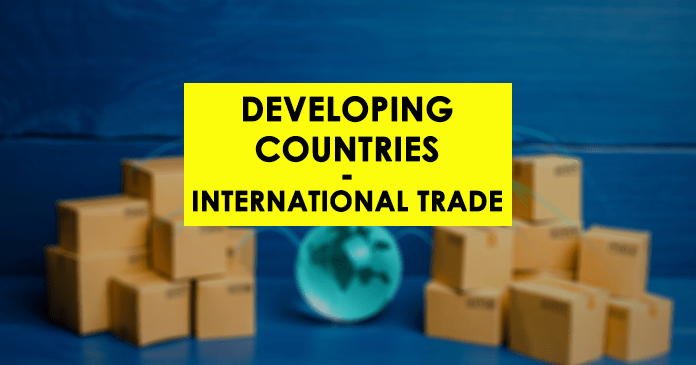International Trade (IT) is the main component of the subject and it is defined as the exchange of goods, capital, and services across international borders or territories.
Why developing countries should focus on international trade as a means of achieving higher economic development?
1. To exploit comparative advantage
- Most developing countries specialized in an industry that is comparatively advantaged to them.
- Manufacturing products and exporting to other international markets will gain income for the developing country.
- Emerging economies such as China, India, Brazil, Vietnam, and other Asian economies need more natural resources to keep their production levels.
- Most developing countries are abundant in natural resources.
- Extracting these natural resources and exporting to foreign markets is advantageous to developing countries.
- The price for these natural resources (such as oil, coal, and other minerals, etc.) is continuously rising.
- Foreign income gained will improve the economic growth of developing countries.
- It helps with the development of the nation (developing countries).
2. International trade benefits the customers
- New products improve customer satisfaction.
- Products at competitive prices.
- Price competition will reduce prices in the local markets (developing countries).
- People can afford these products.
- Economic growth will improve.
- The living condition will improve, leading to economic development.
3. More production targeting international trade will promote economies of scale
- Organizations are increasing their products and services as new market opportunities arise.
- New markets require organizations to expand their capacities.
- Higher capacities allow organizations to gain economies of scale.
- Organizations able to improve their sales and profitability.
- The government can earn high corporate and personal income taxes.
- The government can spend this tax income on development projects.
- Less dependence on foreign sources of funding for development projects.
4. Technological Transfer
- When organizations from developing countries enter into international trade, they can experience technological advancements in developed countries.
- Organizations can quickly adopt these new technologies or develop networks that facilitate them to share expertise in each field.
- Organizations can gain membership in international industrial organizations that enable them to share knowledge.
- Technological advancement enables firms in developing countries to improve efficiency and profitability.
- These organizations can later transform their expertise to local businesses through employees.
Barriers to trade for a developing country
1. Most developing countries are specialized in exporting primary products, natural resources, or basic exports
Reasons,
- Falling prices of natural resources such as gold, coal, oil, and other minerals.
- Depletion of natural resources.
- Demand for natural resources are reducing (iron).
2. Price Fluctuation for natural resources
- Inelastic demand and supply for natural resources and agricultural products.
- Bumper harvest or drought will impact the price to change sharply compared to changes in demand.
3. Developing countries have less access to international markets
- Developing countries produce basic products.
- Their technological and quality concerns are low.
- Developed countries put non-tariff barriers.
- Developed countries protect their own industries/ manufacturers and discourage exporters from developing countries by following a protectionist policy.
- Weak currencies of developing countries are uncompetitive in international trade.
- Developing countries lose income through currency conversion.
Policies that can promote international trade to develop the economies of developing countries
1. Import Substitution Industrialization
Governments of the developing countries charge taxes/tariff on imported commodities with the expectation of protecting local manufacturers where by moving the economy from manufacturing primary products (such as agriculture) to manufacturing products (value added products).
The government needs to identify the domestic industries, offer subsidies, and follow a protectionist approach.
Benefits
- Protect the national economy and national industries
- Developing economies are less depend on foreign companies
- Create domestic job opportunities
- Protect local culture and local society
Weaknesses
- This policy might create jobs in the short run but lose jobs in the long run.
- Once country protect their domestic industry, other countries will ban your exports.
- Customer satisfaction and cost is high.
- Competition is less and price high.
- Higher inflations in the local economy.
2. Trade Liberalization
Removal of tariff barriers, quotas, export subsidies and administrative legislation.
Washington Consensus
- World Trade Organisation (WTO) is responsible of this
- IMF
- US Treasury Department
Government policies to support trade liberalization includes,
- Privatization
- Deregulation
- Property rights
- Competitive exchange rate
- Lower taxes and tariff rates
- Fiscal discipline Interest rate liberalization
3. Diversification (in exports)
- Most developing countries are specialized in primary product export (demand and supply are inelastic).
- Diversifying exports of developing countries.
- Maintain and create competitiveness in the international market.
- To solve this developing countries should move to the manufacturing and semi-manufacturing sector and export these products.
Ex: Rather than exporting cotton the developing country can manufacture yarn, fabric, or garments manufacturing and then export
Developed nations often create barriers to these developing nations (non-tariff barriers, embargos)
- The government of developing nations should concentrate on developing a skilled workforce to promote diversification in their country.


